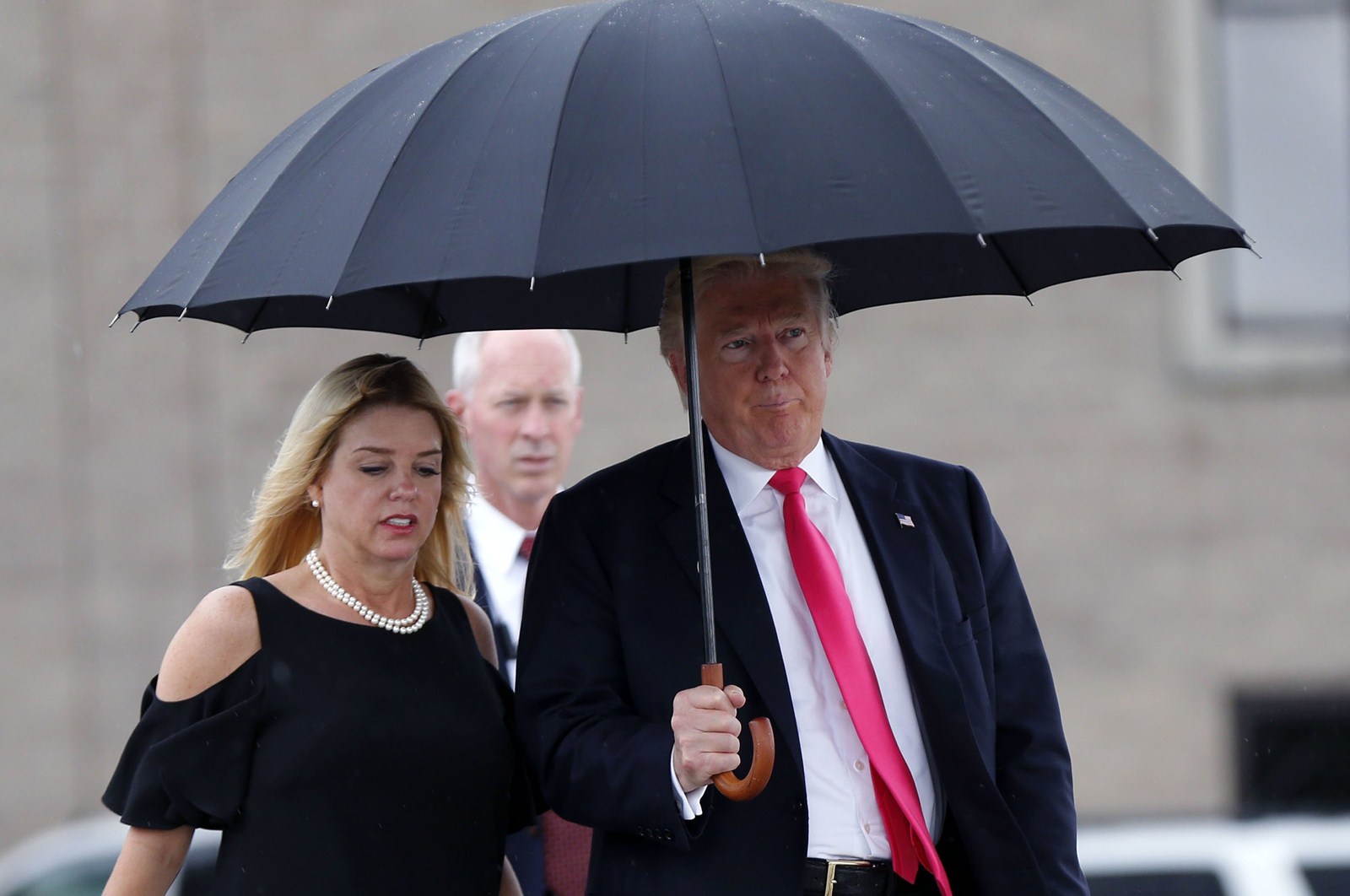Donald Trump should look to his own party and foundation to find ‘pay to play'

Republican presidential candidate Donald Trump arrives at a campaign rally with Florida Attorney General Pam Bondi. Ms. Bondi dropped an investigation into Trump University shortly after receiving a donation from the Trump Foundation. ( Gerald Herbert/AP )
I guess I'm confused, but I'm sure someone can explain it to me. Donald Trump and the Republican Party are now focusing on the Clinton Foundation as a “pay to play” operation. Donations to the foundation were, according to Mr. Trump and other conservatives, used to secure access and influence while Hillary Clinton was secretary of state and would be used in the future to influence her as president, if elected.
I looked at the Clinton Foundation and its work on the Internet; they have a website. What I saw was a foundation with multiple initiatives all over the world to help the sick, the poor and the disadvantaged. Here is a sample (from the foundation website):
The Clinton Development Initiative's Anchor Farm projects in Tanzania,Rwanda and Malawi worked with more than 77,000 smallholder farmers, providing climate-smart agronomic training and access to markets and services for maize, soya and sunflower production;
The Clinton Health Matters Initiative, which aims to improve the health and wellness in communities across the United States, generated dozens of formalized strategic partnerships with national and local entities. These partnerships collectively reflect investments and projects that will reach more than 50 million people across the country.
The Clinton Giustra Enterprise Partnership (CGEP), which creates social enterprises that help people lift themselves out of poverty, expanded its work in 2014. CGEP created a distribution enterprise in Peru and a peanut supply chain enterprise in Haiti, where it also supported the growth of entrepreneurial businesses across Haiti and provided agricultural training and inputs to hundreds of coffee farmers. CGEP also began working with more than 500 farmers across Latin America, registered more than 3,000 students in its training center enterprise in Colombia between 2013 and 2015, and recruited and hundreds of female entrepreneurs in Peru and Haiti.
I also saw audited financial statements, annual reports and IRS Form 990s “Return of Organization Exempt from Income Tax.” The Form 990s shows, among many other things, all large donors and the range of the donations. The audited financial statements and annual reports detail all activities of the foundation and related entities down to the last dollar.
Transparency? I think so. Pay to play? Hardly.
Problems clearly arise when I look at American Crossroads, Karl Rove's CPAC; or Restore Our Future, another Republican CPAC; or any of a number of CPACs that falsely claim they are educational in nature and not political so they can hide their donors and how much they donated — donors who give millions to campaigns for what reason? To secure access and influence with the candidate — “pay to play” if you will.
And what about the Trump Foundation? It was fined $2,500 by the IRS in 2013 for making an illegal $25,000 donation to Florida's attorney general, who then coincidentally chose not to proceed with a fraud investigation of Trump University. Or the Koch brothers' audition of Republican candidates to determine which ones will receive financial support — one of many auditions by billionaires lately? Pay for play?
Fredreka Schouten of USA Today spoke with Charles Koch last year and wrote that he was “considering throwing his political might into the Republican presidential primary for the first time and is likely to provide financial help to several contenders before settling on a single candidate.”
She added: “Koch, his brother David and their team have identified five candidates who have the right message,” and, according to Mr. Koch, “a good chance of getting elected.” The candidates were identified as Wisconsin Gov. Scott Walker, former Florida governor Jeb Bush and Sens. Ted Cruz of Texas, Rand Paul of Kentucky and Marco Rubio of Florida. “Those are the ones we have talked to the most and who seem to be the possible leaders,” Mr. Koch said during the interview.
“What we've told them all is that right now, we're not supporting anyone,” Mr. Koch said. “We're telling them that if they want our support, one way to get it is articulating a good message to help Americans get a better understanding and a better appreciation of how certain policies … will benefit them and will benefit all America.”
Pay for play?
Kenneth Buck is a retired federal law enforcement officer. His email is kpbuck@verizon.net.



 PREVIOUS ARTICLE
PREVIOUS ARTICLE
